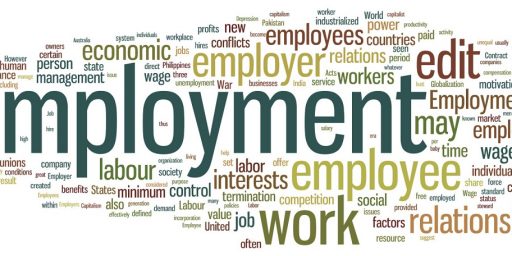Why Don’t More People Go to College?
Joseph Altonji, Prashant Bharadwaj, and Fabian Lange observe that, despite increasing economic incentives for people to obtain college degrees, the percentage of people graduating high school and college has been declining. They note several studies showing the high correlation between college attendance and parental educational attainment.
They conclude,
At this point we can only speculate as to why the response in skills to the increase in skill premia is so small. It is possible that for many young adults the economic incentives for acquiring skills are less important than the non-pecuniary costs of skill investments. For these young adults, a change in the economic incentives to invest into skills might therefore induce only a small supply response. Another plausible explanation is that young adults are liquidity constrained or myopic in their investment decisions for other reasons. If this is the case, they might forego valuable investment opportunities in order to protect their consumption while young. This explanation would, for instance, be consistent with a number of studies (e.g. Kane (1994), Dynarski (2003)) that find that schooling decisions are quite sensitive to direct costs of schooling and tuition subsidies. The importance of liquidity constraints is controversial, however. Cameron and Taber (2004) is one of a number of studies that finds that liquidity constraints are not important for explaining schooling decisions.
Research summarized in Cunha and Heckman (2007) suggests that part of the explanation might be that parental investment during early childhood shapes the potential to acquire additional skills later in life. Parents might not have responded to the increase in labour market returns, perhaps because they were not fully aware of the large increase in the returns to skills or because their children’s labour market success might not be the primary motivating factor in determining the time and resources they devote to their children.
Brad DeLong summarizes the research: “Altonji, Bharadwaj, and Lange do not know.”
Tyler Cowen quips, “I can only conclude that Altonji, Bharadwaj, and Lange have never taught Introduction to Composition to a large group of freshman in a public university in the United States. Anyone who has taught such a class — or for that matter talked to anyone who has — will have some inkling why more people are not going to college.”
What’s not covered in the research summary, are two rather obvious trends: immigration and rising tuition costs.
First, a new surge in immigration, especially from less developed countries, surely skews the calculations. If kids are more likely to go to college if their parents have, and we’re increasing the population of less educated parents, this seems quite plausible.
Second, the cost of college is skyrocketing. While the return on a college degree may be increasing, the initial investment is going up tremendously. The state teaching college where I obtained my undergraduate degree two decades ago now charges $5070 annually for tuition. That’s still a relative bargain. But it was a mere $800 a year when I graduated. Adjusting for inflation, it should now cost only $1442.13. So, the cost has jumped 350 percent in real dollars. My strong hunch is that the value of a college education has not similarly appreciated in the intervening years. Surely, the changes the calculus?






I don’t why people believe that everyone should go to college. If that’s so, that will only cheapen the value of a college degree, and will push more people to get Masters or PhDs to stand out from the crowd. Many people do not deserve to, nor need to, go to college to get jobs. We need a good vocational education system in this country to provide skills for those that are not inclined to go to college.
I agree fully but the premise of the study is that the economic incentives exist to obtain a college degree. We can change that by destigmatizing vo-tech degrees but that’s a pretty big cultural shift.
Americans are shrewd observers of the market. A college degree isn’t the ticket to a comfortable, secure future it once was. Indeed, neither is a graduate degree (absent the gatekeeper advantages that accrue to some graduate degrees).
Americans are, prudently, pursuing fields that already have protections against competition, particularly those that don’t require college degrees, and I expect they’ll use the political system to extend the number of those.
Consider, too, that much of the job growth in the last several years has been in government and construction. The construction industry isn’t noted for requiring college educations and, indeed, many of the government jobs added in recent years haven’t required college degrees, either.
If we want people to pursue college degrees, the surest way to encourage that is to increase the number of good, secure jobs for college graduates that are available. Otherwise we’re asking people to take on an increased level of risk (the time spent, the costs, foregone income) for little foreseeable gain.
Could it be that those economic incentives (which have been spelled out by those who in turn have an incentive to get people to go to college) may be exaggerated. Or at least exaggerated for the majority of potential students?
My father was the first in his family to go to be something other than a farmer or pastor (first college graduate with other than a divinity degree). My generation mostly went to college, though a fair number started their own business. The following generation is seeing a lot less college and more going into their own business.
If you take the seed money of a college education and start your own business, you may do just as well or better.
I agree with DC Loser, at 27 I’m on the tail end of that “every child must go to college” trend and quite frankly I never got what was so special about having a degree. Couple that wit the fact that many of us have parents with successful careers and no college degree, the “why” question resounds even louder.
Also from my 27 year old standpoint; many of us early/mid/late 20 somethings know several people who spent outrageous amounts on a college education only to find that they can’t find work in their chosen field or are under-employed. From that viewpoint spending $20K (and yes, that is a bargain) on a “maybe” isn’t feasible.
I wouldn’t be surprised if immigration did skew the numbers, but I honestly don’t know which way they would skew, especially if we are talking about legal immigrants. Of course, I am pretty sure that I have a distorted view of immigrants. All of the immigrants that I have any knowledge of are H1-B engineers or EB-1 or EB-2 category green card applicants (which generally require advanced degrees), and they would tend to skew the trend toward more college education rather than less.
mq, the question, though, is not whether or not there is really anything special about a degree, but how to reconcile the data that shows a significant salary incentive to get a degree, to the data that shows not that many people getting a degree.
This article contains the same subtle bias as the earlier article titled “Working Man’s PHD”, except sort of reversed.
The umbrage taken in that article was that “educated” people don’t work.
In this article, it is that those who do not attend college are uneducated.
These assumptions are equally untrue. In fact it is quite possible to be well educated without college or to remain uneducated with a degree.
Perhaps a diploma is no longer the “ticket” to secure lucrative employment that it once was.
The non-college worker gets a four year head start in Career development without the accumulation of debt associated with formal education. Even an associates degree allows for a two year head start at a fraction of the debt.
Medicine and engineering are examples of a valid use of “higher education”. Seeking other degrees [in areas like “liberal arts”] has been slipping ever closer to a frivolous use of “higher education” in recent years.
But all the evidence is that a diploma is far more valuable than it used to be. However, for some reason, people don’t want to accept that.
I think we need to look at the marginal case. Back in the day if you partied through High School and eventually dropped out and took a job at the plant, you could make X. If you studied and worked hard and made it through High School and College you could make 2X. Now, that is up to 4X or 6X. However, at the margin, the guy who could, with perhapse 10% more effort, get a degree, still won’t work that extra 10%.
If a young person likes to work with his or her hands, get an apprenticeship as a plumber/carpenter/electrician. From what they’re charging, I KNOW they make more than a lot of college graduates.
Perhaps because that’s not what the evidence says. What the evidence says is that some diplomas are worth a lot more than they used to be. The evidence doesn’t demonstrate that all diplomas are worth more than they used to be nor does it demonstrate that the diplomas are worth more are worth more because they are diplomas.
It is a little bit of a shame to see college degrees discussed primarily as a vocational certificate, no matter the field. There was a time, not that long ago, when one of the reasons for going to college was to learn to think and to become a well rounded individual, in addition to preparing to enter your vocation, whatever that turned out to be.
At the same time, the No Child Left Unmatriculated program swung the pendulum way too far and colleges reacted by increasing the price to what the market would bear. Now the bear is biting back. It would have cost as much as I paid to buy my house (which is far from paid off) to send my daughter to one particular state school she was considering. That’s a problem.
JMO;
Perhaps, but what about “back in the day”if you partied all through high school and eventually partied all through college , taking 6 years to get a degree, you would spend x to make 2x. If you studied and worked hard all through high school and beyond to learn a skill or to develop a business you could make 2x or even 4x without spending x in time or money for college.
Perhaps the real difference is not the diploma , but rather as you say “that 10% more effort that is required for success regardless of classroom hours or sheepskins.
BTW; don’t forget my caveat. [The type of degree]
floyd,
Salary of Senior Accountant $58,559
Salary of Master Plumber $48,440
Now, the interesting question would be to find out the average salary of a Senior Accountant vs. Master Plumber in 2008, 1998, 1988, 1978, 1968. Now, if we see a growing gap between the two would that change your mind?
Reading the comments above with the “what’s so special about a college degree” attitude reinforces my belief that immigrants keep this country afloat: first generation immigrants who appreciate that US is still very much the land of opportunities. These people work hard, graduate from top institutions: Yale, Duke, etc. and accomplish their American dream.
And then you have Billy Bob with his sixpack, NASCAR, country music and disdain for intellectuals, liberals, and anybody who isn’t like him. Thank god Billy Bob will forever be resigned to enjoying the “bread and the circuses” and nothing more.
I think the type of degree makes a difference.
Some degrees don’t have the big a return, others do.
I think the real question isn’t why more aren’t going but whether college is the right route to meet their interests and goals. In the town I live in, the plumber makes almost 100k a year, because he is one of the only ones in the area.
We are friends with a guy who runs a car shop, and he struggles to find qualified mechanics. At his shop a fully qualified mechanic makes more per year than a certified teacher with a few years experience under their belts makes in this area.
Supply and demand has a lot to do with just how much salary a person can command.
Denigrating the “trades” as they used to be called, is the fault of the Teachers Unions and Academia in general. Curiously, though-a good plumber makes $40 an hour and a teacher makes $40K a year. I may need a plumber in the middle of the night, but I won’t need a teacher in the middle of the night.
JMO;
No need to change my mind. I refer you to my caveat.
I know lots of welders, electricians, and mechanics who make over $75,000 without overtime.
Most of these guys make six figures every year.
So would your plumber if he called himself a pipefitter.[lol]
Does that change your mind?
floyd,
I’m not saying that there aren’t guys in the trades making 100k, I’m saying that over the past 30 years the income gap has grown between those in the trades and those with a college education.
Do you think that isn’t the case?
I know lots of welders, electricians, and mechanics who make over $35,000 without overtime but they don’t have to vote Democrat.
Floyd,
Take a look at the census data – workers who work in “Precision, Production, Craft, and Repair Occupations” aka “The Trades” have seen their inflation adjusted income stangnate since 1982.
Those in “Managerial and Professional Speciality Occupations” have seen their incomes rise significantly.
http://www.census.gov/hhes/www/income/histinc/p45.html
I think if you look at the data, the idea that the trades are doing well just isn’t borne out by the facts.
JMO;
My point is that clear goals and diligence
will overcome any difference in the source of education.*
1]Professional jobs currently require more formal education.
2] Skilled crafts require more training
3]Managerial jobs require more…..well we know what they require![grinz]
4] The problem is that virtually ALL of the “dropouts” and failures fall statistically on the NON-degreed side of the equation.
5] Personal success requires education, formal or otherwise!
6] When corrected for diligence and vision, the success rates measured in dollars would narrow.*
*source… pure conjecture, observation and common sense.